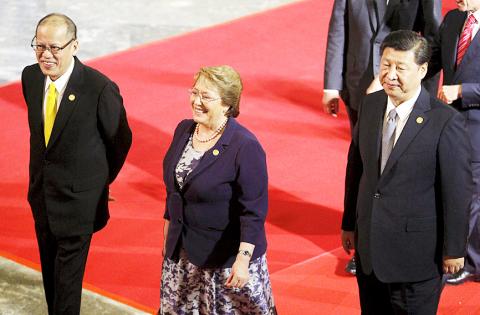US President Barack Obama yesterday demanded China end artificial island building in the South China Sea, upping the pressure on Beijing at the annual APEC summit.
The gathering is meant to forge unity on trade among 21 Pacific rim economies that group 3 billion people.
However, the territorial row over the strategically vital South China Sea, as well as terrorism concerns following last week’s Paris rampage, have dominated the build-up to this year’s meeting in the Philippines.

Photo: Reuters
China has repeatedly insisted its disputes with its Asian neighbors over the sea should not be on the APEC agenda, but just hours before the two-day summit started, Obama voiced concerns over giant land reclamation works by China that have created new islands close to the Philippines.
“We discussed the impact of China’s land reclamation and construction activities on regional stability,” Obama told reporters after meeting Philippine President Benigno Aquino III.
“We agree on the need for bold steps to lower tensions, including pledging to halt further reclamation, new construction, and militarization of disputed areas in the South China Sea,” he said.
In a speech at a business forum in Manila ahead of the summit, Chinese President Xi Jinping (習近平) did not directly mention the territorial disputes, but he did call on Pacific nations to “resolve our differences through dialogue and consultation.”
The icy relations between Manila and Beijing because of their territorial disputes were clear to see as Xi took a long and lonely red carpet walk. Aquino led the heads of the APEC delegations along a red carpet laid throughout the summit venue to a stage where they gathered for the opening ceremony. Xi and Chilean President Michelle Bachelet were in the front row alongside Aquino, but he only chatted with Bachelet, leaving Xi to plod on alone.
Additional reporting by AP

INVESTIGATION: The case is the latest instance of a DPP figure being implicated in an espionage network accused of allegedly leaking information to Chinese intelligence Democratic Progressive Party (DPP) member Ho Jen-chieh (何仁傑) was detained and held incommunicado yesterday on suspicion of spying for China during his tenure as assistant to then-minister of foreign affairs Joseph Wu (吳釗燮). The Taipei District Prosecutors’ Office said Ho was implicated during its investigation into alleged spying activities by former Presidential Office consultant Wu Shang-yu (吳尚雨). Prosecutors said there is reason to believe Ho breached the National Security Act (國家安全法) by leaking classified Ministry of Foreign Affairs information to Chinese intelligence. Following interrogation, prosecutors petitioned the Taipei District Court to detain Ho, citing concerns over potential collusion or tampering of evidence. The

Seventy percent of middle and elementary schools now conduct English classes entirely in English, the Ministry of Education said, as it encourages schools nationwide to adopt this practice Minister of Education (MOE) Cheng Ying-yao (鄭英耀) is scheduled to present a report on the government’s bilingual education policy to the Legislative Yuan’s Education and Culture Committee today. The report would outline strategies aimed at expanding access to education, reducing regional disparities and improving talent cultivation. Implementation of bilingual education policies has varied across local governments, occasionally drawing public criticism. For example, some schools have required teachers of non-English subjects to pass English proficiency

NEGOTIATIONS: The US response to the countermeasures and plans Taiwan presented has been positive, including boosting procurement and investment, the president said Taiwan is included in the first group for trade negotiations with the US, President William Lai (賴清德) said yesterday, as he seeks to shield Taiwanese exporters from a 32 percent tariff. In Washington, US Trade Representative Jamieson Greer said in an interview on Fox News on Thursday that he would speak to his Taiwanese and Israeli counterparts yesterday about tariffs after holding a long discussion with the Vietnamese earlier. US President Donald Trump on Wednesday postponed punishing levies on multiple trade partners, including Taiwan, for three months after trillions of US dollars were wiped off global markets. He has maintained a 10 percent

TRADE: The premier pledged safeguards on ‘Made in Taiwan’ labeling, anti-dumping measures and stricter export controls to strengthen its position in trade talks Products labeled “made in Taiwan” must be genuinely made in Taiwan, Premier Cho Jung-tai (卓榮泰) said yesterday, vowing to enforce strict safeguards against “origin laundering” and initiate anti-dumping investigations to prevent China dumping its products in Taiwan. Cho made the remarks in a discussion session with representatives from industries in Kaohsiung. In response to the US government’s recent announcement of “reciprocal” tariffs on its trading partners, President William Lai (賴清德) and Cho last week began a series of consultations with industry leaders nationwide to gather feedback and address concerns. Taiwanese and US officials held a videoconference on Friday evening to discuss the